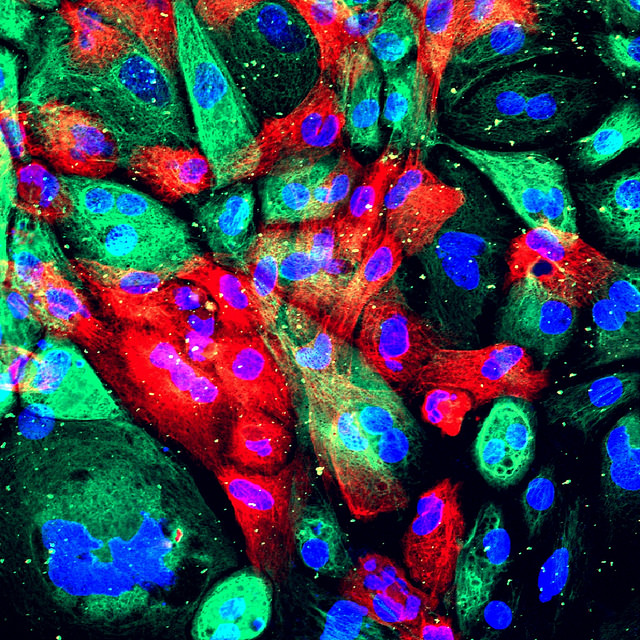
GenomeDx Biosciences said today it will use its Decipher Prostate Cancer Classifier tests, and the database from which they are derived, to test samples from multiple clinical trials by Johnson & Johnson’s Janssen Pharmaceuticals in order to assess prostate cancer candidates.
The companies plan to examine the association of prognostic and predictive signatures available on GenomeDx’s Decipher Genomics Resource Information Database (GRID) collaborative research platform with clinical outcomes.
According to GenomeDx, GRID is a tumor RNA expression database for urologic cancers, with more than 40,000 genomic profiles. Each profile consists of more than 1,4 million markers, covering 46,000 coding and non-coding genes, and contains patient demographics, clinical information, and pathology features.
GRID profiles include over 70 genes and signatures designed to reveal the tumor’s molecular subtypes and active biological pathways, as well as to predict tumor stage, risk of recurrence, and response to therapy.
The GRID research program has contributed to more than 45 scientific publications, and several genomic solutions in clinical use.
“Using Decipher and GRID to leverage the knowledge derived from thousands of tumor genomic profiles to uncover novel predictors of treatment response with machine learning approaches will help realize our mutual goal of personalizing therapy for men suffering from this disease,” GenomeDx President and CSO Elai Davicioni, PhD., said in a statement.
Janssen won two FDA approvals for prostate cancer treatments in February. On February 8, the agency authorized a new indication for Janssen’s marketed cancer drug Zytiga (abiraterone acetate), in combination with prednisone for patients with metastatic high-risk castration-sensitive prostate cancer (CSPC).
Six days later, the FDA approved Janssen’s Erleada (apalutamide, formerly ARN-509) for non-metastatic castration-resistant prostate cancer. Erleada is also in Phase III development for metastatic hormone sensitive prostate cancer, localized prostate cancer—and in combination with Zytiga for chemotherapy-naïve metastatic CSPC.
Prostate cancer is one of three “disease area strongholds” (DAS) of Janssen’s Oncology R&D group, along with hematologic malignancies and lung cancer. Each DAS is designed to integrate and strategically align its discovery and clinical development areas, including biomarkers and translational medicine, with its commercial capabilities
Within prostate cancer, Janssen says its areas of highest focus include patients resistant to current treatment options; early disease segments that distinguish “aggressive” vs. “indolent” disease; adjuvant and neo-adjuvant treatment. Janssen’s molecular pathways of interest, according to its website, include:
- Direct targeting of ligand-independent activity Androgen Receptor (AR) (e.g., AR cofactors, AR degraders)
- Growth factor pathways that impact AR function or are downstream of AR
- Immune therapies T cell checkpoint and agonist pathways
Oncology is one of Janssen’s five therapeutic areas, along with cardiovascular and metabolism, immunology, infectious diseases and vaccines, and neuroscience.
Janssen is not the first biopharma with which GenomeDx has partnered. Last year, the company said GRID and its Decipher Classifier tests would be used by Astellas Pharma to identify active-surveillance prostate cancer patients who may benefit from Xtandi (enzalutamide), the prostate cancer treatment it co-markets with Pfizer.
Decipher Classifier tests, derived from GRID, are commercially available genomic tests designed to provide a genomic assessment of tumor aggressiveness for individual patients. The tests include Decipher Biopsy, indicated for men with localized prostate cancer at diagnosis; and Decipher RP, indicated for men after prostate removal surgery.
According to GenomeDx, Decipher tests are used by physicians to stratify patients into more accurate risk groups than determined by traditional diagnostic tools and to better determine which patients may be more likely to benefit from additional treatment. Each tumor analyzed with a Decipher test adds new data to the GRID database. That data, in turn, is compiled into a Decipher GRID Profile that according to GenomeDx may reveal additional biological characteristics of the tumor for ongoing research purposes.
“We are excited to work together with Janssen on this important research collaboration, which we believe will accelerate the discovery and development of genomic solutions for the treatment and management of high-risk prostate cancer,” Dr. Davicioni added.












